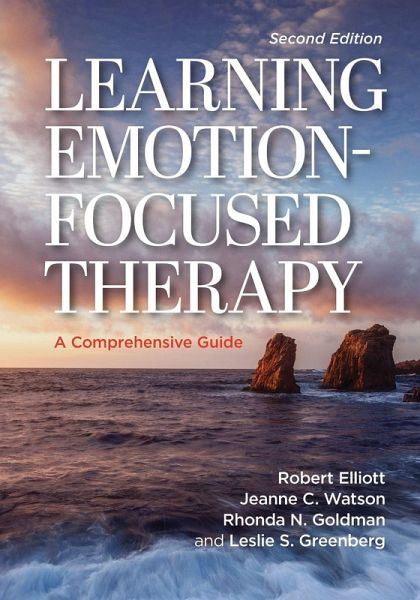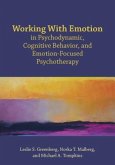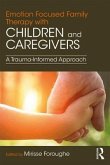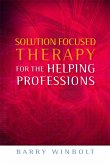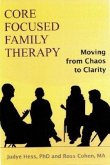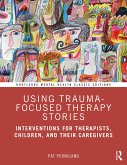Robert Kingwill Elliott Jr, Jeanne C Watson, Rhonda N Goldman, Leslie S Greenberg
Learning Emotion-Focused Therapy
The Process-Experiential Approach to Change
Robert Kingwill Elliott Jr, Jeanne C Watson, Rhonda N Goldman, Leslie S Greenberg
Learning Emotion-Focused Therapy
The Process-Experiential Approach to Change
- Broschiertes Buch
- Merkliste
- Auf die Merkliste
- Bewerten Bewerten
- Teilen
- Produkt teilen
- Produkterinnerung
- Produkterinnerung
Updates a classic text on emotion-focused therapy with over 20 years of research and theory.
Andere Kunden interessierten sich auch für
![Working with Emotion in Psychodynamic, Cognitive Behavior, and Emotion-Focused Psychotherapy Working with Emotion in Psychodynamic, Cognitive Behavior, and Emotion-Focused Psychotherapy]() Leslie S. GreenbergWorking with Emotion in Psychodynamic, Cognitive Behavior, and Emotion-Focused Psychotherapy66,99 €
Leslie S. GreenbergWorking with Emotion in Psychodynamic, Cognitive Behavior, and Emotion-Focused Psychotherapy66,99 €![Emotion Focused Family Therapy with Children and Caregivers Emotion Focused Family Therapy with Children and Caregivers]() Emotion Focused Family Therapy with Children and Caregivers38,99 €
Emotion Focused Family Therapy with Children and Caregivers38,99 €![EMDR and Attachment-Focused Trauma Therapy for Adults EMDR and Attachment-Focused Trauma Therapy for Adults]() Ann E PotterEMDR and Attachment-Focused Trauma Therapy for Adults90,99 €
Ann E PotterEMDR and Attachment-Focused Trauma Therapy for Adults90,99 €![Solution Focused Brief Therapy in Alternative Schools Solution Focused Brief Therapy in Alternative Schools]() Cynthia FranklinSolution Focused Brief Therapy in Alternative Schools41,99 €
Cynthia FranklinSolution Focused Brief Therapy in Alternative Schools41,99 €![Solution Focused Therapy for the Helping Professions Solution Focused Therapy for the Helping Professions]() Barry WinboltSolution Focused Therapy for the Helping Professions45,99 €
Barry WinboltSolution Focused Therapy for the Helping Professions45,99 €![Core Focused Family Therapy Core Focused Family Therapy]() Judye HessCore Focused Family Therapy27,99 €
Judye HessCore Focused Family Therapy27,99 €![Using Trauma-Focused Therapy Stories Using Trauma-Focused Therapy Stories]() Pat PernicanoUsing Trauma-Focused Therapy Stories51,99 €
Pat PernicanoUsing Trauma-Focused Therapy Stories51,99 €-
-
-
Updates a classic text on emotion-focused therapy with over 20 years of research and theory.
Hinweis: Dieser Artikel kann nur an eine deutsche Lieferadresse ausgeliefert werden.
Hinweis: Dieser Artikel kann nur an eine deutsche Lieferadresse ausgeliefert werden.
Produktdetails
- Produktdetails
- Verlag: American Psychological Association (APA)
- 2nd edition
- Seitenzahl: 566
- Erscheinungstermin: 26. August 2025
- Englisch
- ISBN-13: 9781433838323
- ISBN-10: 143383832X
- Artikelnr.: 72181828
- Herstellerkennzeichnung
- Libri GmbH
- Europaallee 1
- 36244 Bad Hersfeld
- gpsr@libri.de
- Verlag: American Psychological Association (APA)
- 2nd edition
- Seitenzahl: 566
- Erscheinungstermin: 26. August 2025
- Englisch
- ISBN-13: 9781433838323
- ISBN-10: 143383832X
- Artikelnr.: 72181828
- Herstellerkennzeichnung
- Libri GmbH
- Europaallee 1
- 36244 Bad Hersfeld
- gpsr@libri.de
Robert Elliott, PhD (preferred pronouns: they/them), is Emeritus Professor of Counselling at the University of Strathclyde (Scotland). Their main interests are training and research on emotion-focused therapy. Recent books include Emotion-Focused Counselling in Action and Essentials of Descriptive-Interpretive Qualitative Research. They have published nearly 200 journal articles or book chapters. They are a past recipient of the Distinguished Research Career Award of the Society for Psychotherapy Research and the Carl Rogers Award from the Division of Humanistic Psychology of the American Psychological Association. Jeanne C. Watson, PhD, is a professor in the counselling and clinical psychology program at Ontario Institute for Studies in Education, the University of Toronto, Canada. A major exponent of humanistic-experiential psychotherapy, she has helped develop emotion-focused psychotherapy, the process experiential approach. She conducts research on the process and outcome of psychotherapy. In 2002, Dr. Watson received the Outstanding Early Career Award from the International Society for Psychotherapy Research and was awarded the Distinguished Career Award in 2020. In 2013, she was appointed a fellow of the American Psychological Association, Division 29, in recognition of her contributions to the discipline. Rhonda N. Goldman, PhD, is a co-developer of emotion-focused therapy (EFT) for individuals and couples. She is a professor of clinical psychology, based at the Chicago School, and founder of the Emotion-Focused Therapy Institute in Chicago. She is a founding board member of the International Society of EFT. Dr. Goldman travels internationally, conducting workshops for mental health professionals on EFT for couples and individuals. She has published many books and articles on related topics such as case formulation, emotional processes, empathy, and vulnerability. She has made several professional videos demonstrating the approach. Follow EFT.Chicago or visit emotionfocusedtherapyinstitute.com or iseft.org. Leslie S. Greenberg, PhD, is Distinguished Research Professor Emeritus of Psychology at York University in Toronto. He has authored the major texts on emotion-focused approaches to treatment. His latest books are Changing Emotion With Emotion: A Practitioner’s Guide (2021) and Working With Shame and Anger (2023). He received the American Psychological Association’s (APA’s) Award for Distinguished Professional Contribution to Applied Research, the Society for Psychotherapy Research’s Distinguished Research Career Award, and the Carl Rogers Award of the APA Society for Humanistic Psychology.
Preface: EFT and the Present Moment
Part I.Introducing Emotion-Focused Therapy
Chapter 1. Getting Started With Learning Emotion-Focused Therapy
Chapter 2. Research on EFT and Implications for Practice
Part II.Fundamentals of EFT: Emotion and Process
Chapter 3. EFT Theory Made Simple
Chapter 4. Following Client Process in EFT: What to Listen for
Chapter 5. Empathy and Presence: Key Therapist Experiential Processes in
EFT
Part III.Specific EFT Processes and Tasks
Chapter 6. Overview of Therapeutic Work in EFT: Tasks and Response Modes
Chapter 7. Case Formulation Work in EFT
Chapter 8. Making and Keeping Contact: The Work of Building and Repairing
Therapeutic Relationships in EFT
Chapter 9. Navigating the Ocean of Empathy in EFT: Micro-Processes and
Tasks
Chapter 10. Focusing and Facilitating Emotional Experiencing
Chapter 11. Narrative and Emotion: Reprocessing Work in EFT
Chapter 12. Working With Negative Treatment of Self
Chapter 13. Working With Unresolved Interpersonal Issues
Chapter 14. Self-Soothing and Self-Compassion Work in EFT: Coping and
Transformation
Part IV.Practical Issues in Applying EFT
Chapter 15. Adapting EFT to Particular Client Presentations
Chapter 16. Working With Emotional Injuries Stemming From Marginalization
Experiences
Chapter 17. Frequently Asked Questions about EFT
Chapter 18. Recommendations for Teaching and Learning EFT
References
Part I.Introducing Emotion-Focused Therapy
Chapter 1. Getting Started With Learning Emotion-Focused Therapy
Chapter 2. Research on EFT and Implications for Practice
Part II.Fundamentals of EFT: Emotion and Process
Chapter 3. EFT Theory Made Simple
Chapter 4. Following Client Process in EFT: What to Listen for
Chapter 5. Empathy and Presence: Key Therapist Experiential Processes in
EFT
Part III.Specific EFT Processes and Tasks
Chapter 6. Overview of Therapeutic Work in EFT: Tasks and Response Modes
Chapter 7. Case Formulation Work in EFT
Chapter 8. Making and Keeping Contact: The Work of Building and Repairing
Therapeutic Relationships in EFT
Chapter 9. Navigating the Ocean of Empathy in EFT: Micro-Processes and
Tasks
Chapter 10. Focusing and Facilitating Emotional Experiencing
Chapter 11. Narrative and Emotion: Reprocessing Work in EFT
Chapter 12. Working With Negative Treatment of Self
Chapter 13. Working With Unresolved Interpersonal Issues
Chapter 14. Self-Soothing and Self-Compassion Work in EFT: Coping and
Transformation
Part IV.Practical Issues in Applying EFT
Chapter 15. Adapting EFT to Particular Client Presentations
Chapter 16. Working With Emotional Injuries Stemming From Marginalization
Experiences
Chapter 17. Frequently Asked Questions about EFT
Chapter 18. Recommendations for Teaching and Learning EFT
References
Preface: EFT and the Present Moment
Part I.Introducing Emotion-Focused Therapy
Chapter 1. Getting Started With Learning Emotion-Focused Therapy
Chapter 2. Research on EFT and Implications for Practice
Part II.Fundamentals of EFT: Emotion and Process
Chapter 3. EFT Theory Made Simple
Chapter 4. Following Client Process in EFT: What to Listen for
Chapter 5. Empathy and Presence: Key Therapist Experiential Processes in
EFT
Part III.Specific EFT Processes and Tasks
Chapter 6. Overview of Therapeutic Work in EFT: Tasks and Response Modes
Chapter 7. Case Formulation Work in EFT
Chapter 8. Making and Keeping Contact: The Work of Building and Repairing
Therapeutic Relationships in EFT
Chapter 9. Navigating the Ocean of Empathy in EFT: Micro-Processes and
Tasks
Chapter 10. Focusing and Facilitating Emotional Experiencing
Chapter 11. Narrative and Emotion: Reprocessing Work in EFT
Chapter 12. Working With Negative Treatment of Self
Chapter 13. Working With Unresolved Interpersonal Issues
Chapter 14. Self-Soothing and Self-Compassion Work in EFT: Coping and
Transformation
Part IV.Practical Issues in Applying EFT
Chapter 15. Adapting EFT to Particular Client Presentations
Chapter 16. Working With Emotional Injuries Stemming From Marginalization
Experiences
Chapter 17. Frequently Asked Questions about EFT
Chapter 18. Recommendations for Teaching and Learning EFT
References
Part I.Introducing Emotion-Focused Therapy
Chapter 1. Getting Started With Learning Emotion-Focused Therapy
Chapter 2. Research on EFT and Implications for Practice
Part II.Fundamentals of EFT: Emotion and Process
Chapter 3. EFT Theory Made Simple
Chapter 4. Following Client Process in EFT: What to Listen for
Chapter 5. Empathy and Presence: Key Therapist Experiential Processes in
EFT
Part III.Specific EFT Processes and Tasks
Chapter 6. Overview of Therapeutic Work in EFT: Tasks and Response Modes
Chapter 7. Case Formulation Work in EFT
Chapter 8. Making and Keeping Contact: The Work of Building and Repairing
Therapeutic Relationships in EFT
Chapter 9. Navigating the Ocean of Empathy in EFT: Micro-Processes and
Tasks
Chapter 10. Focusing and Facilitating Emotional Experiencing
Chapter 11. Narrative and Emotion: Reprocessing Work in EFT
Chapter 12. Working With Negative Treatment of Self
Chapter 13. Working With Unresolved Interpersonal Issues
Chapter 14. Self-Soothing and Self-Compassion Work in EFT: Coping and
Transformation
Part IV.Practical Issues in Applying EFT
Chapter 15. Adapting EFT to Particular Client Presentations
Chapter 16. Working With Emotional Injuries Stemming From Marginalization
Experiences
Chapter 17. Frequently Asked Questions about EFT
Chapter 18. Recommendations for Teaching and Learning EFT
References

